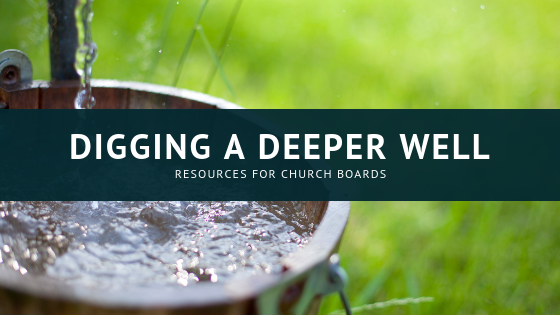As we go about our church board business—building agendas, leading meetings, showing up for worship and programs, recruiting volunteers from a dwindling list, solving budget crises, and on and on—we need to be attuned to a voice crying, Stop!
That voice may sound counterintuitive. In the urgency (anxiety) of the moment, boards and pastors can often hear only a voice calling, Do something, do anything! The voice calling, Stop! can be seen as costly, given that urgency. Alternatively, Stop! can be seen as a gift.
That voice may come from within the congregation—or within us.
It may come from someone on the street needing something that we don’t know how to give.
It may come from the larger culture, in the form of a report confirming steep declines in religious attendance, participation, and giving.
What to do? Should we stop?
Sometimes, the first response of a church board is honest empty-handedness: we don’t know what to do—or at least don’t know how to do it without risking the very institution in our care.
Montana poet Lowell Jaeger’s finely described poem, Okay, focuses on the feeling of being responsible, yet honestly not knowing how to respond.
Okay
By Lowell Jaeger
There’s a man in the road, waving.
We’re driving home from Hot Springs,
my wife and I, and our three kids.
He’s holding something bundled
in his arms. Don’t stop, my wife
telegraphs to me with a sideways glance.
I’m okay with that.
It’s a dog! the kids shout, He’s
carrying a dog! So, okay, I stop,
roll down the window.
Please help, the man says, tears
leaking down his stubbled chin.
The dog is bleeding. He’s rolled up
in an old rug, eyes open, miserable.
just run over my dog, the man
blubbers, He’s drunk. And stinks.
Okay, I’m thinking, I’m stuck
with this. The kids squeeze together;
the man and dog huff and groan,
sniffle and slide themselves into
our lives. My kids’ faces in the rearview
are pinched, afraid to breathe –
wet dog, blood, booze, rotting socks.
The man whimpers, cradles his dog,
I’m f-ing sorry, man. So f-ing, f-ing
sorry. This is less than okay.
We spit gravel behind us and speed
back to Hot Springs to find a Vet.
It’s a Sunday, my wife whispers, everything’s
locked up. I’m thinking, Okay, what now?
At the one payphone on Main, I pull over
to let the man and dog out. You better call
someone, I say. My voice sounds afraid.
The man’s eyes are shut, not asleep,
but almost. The dog’s eyes are shut, too.
You better call someone, I say louder,
Okay? Okay?
The man stands at the payphone, his dog
bundled on the sidewalk. He just stands there.
My kids cry silently. My wife trusts me
to be the man she hopes I am. I don’t
know what’s okay and what’s not. The man
is fumbling in his empty pockets for change.
I feel a lot like that.
- Why does the narrator stop the car?
- Should the narrator have stopped for the man in the road? Why or why not?
- What is the narrator fumbling for at the end?
- Why is the poem titled “Okay?” What does “okay” mean, in the context of this poem?
- How are you, as church board leaders, being asked to stop—or not to stop—as you guide your congregation forward? What voices are you hearing calling on you to stop—or not to stop?
- How do you respond? What do you reach for, to help you respond to these voices?
- In the current context, what is okay?








Anonymous
Posted at 15:58h, 10 Maythis poem sucks i hate it